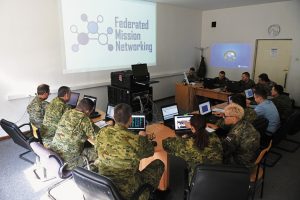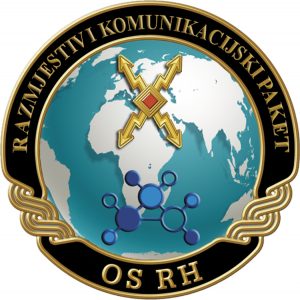The Evaluator Team of the General Staff of the Croatian Armed Forces headed by Colonel…
Test of National Information Exchange System Supporting NATO Operations
 Federated Mission Networking (FMN) denotes the networking of national and allied networks supporting NATO operations into a “federation” with the aim of securing the adequate level of interoperability in joint operations.
Federated Mission Networking (FMN) denotes the networking of national and allied networks supporting NATO operations into a “federation” with the aim of securing the adequate level of interoperability in joint operations.
The concept of FMN was developed on the basis of Afghanistan Mission Network (AMN), a communication and information network which was developed and expanded for missions ISAF Resolute Support. Upon the allied forces’ arrival to Afghanistan at the start of ISAF, the lack of interoperability was defined as one of the missions’ key drawbacks. This was visible in considerable communication limitations and the restricted exchange of information among forces from various countries on a tactical and operational level. It was necessary to construct a communication and information network that would secure undisturbed, shielded exchange of information among coalition forces and command posts on a tactical and operational level. This objective was eventually realized through the AMN.
FMN defines the principles and standard of connecting various national and coalition networks into a single “federation”, which is a precondition for the construction of common situational awareness. This conceptual framework is focused on command posts in an operation, supports the decision-making process and secures an undisturbed exchange of information. The concept is made up of people, processes and various technologies which are used to standardize the planning, preparation, establishment, usage and cancellation of networks in operations. The Republic of Croatia joined the framework of FMN in March 2016. Its capability levels at the time were sufficient to support the Croatian Armed Forces’ ambition to take part in NATO-led operations.
So as to realize capability goals and enable the Croatian Armed Forces to participate in NATO operations and exercises with a unit which had a staff structure, it was necessary to adjust the level of Croatia’s ambition to participate in FMN. Therefore, the FMN Implementation Team was formed for Option B (a higher level of capabilities essential for the establishment of a national command post in an operation) in July 2018. The team is headed by the Chief of the Communication and Information Systems Directorate of the General Staff of the Croatian Armed Forces Brigadier General Ante Tolić. At the same time, the development of the Deployable Communications Package, a deployable communication and information system for the support of a command post, was initiated. For reasons of economy, the system is being developed on open-source software such as Linux.
“The goal of the concept is the so-called day-zero interoperability, i.e. the readiness of all national components for the exchange of information at the start of an operation, in accordance with the Plug and Play principle,” explains Captain Military Specialist Željka Petrović, Deputy National Leader and Capability Leader in FMN Core Services.
 So as to verify the capabilities of the Deployable Communications Package and its compatibility with the technical specifications of FMN, a team from the Croatian Armed Forces participated in international military exercise Coalition Warrior Interoperability eXploration, eXperimentation, eXamination, eXercise (CWIX) in 2018. CWIX is an annual exercise held at the Joint Force Training Centre in Bydgoszcz, Poland. It is devised in such a way that it tests the interoperability of national communication and information systems and officially verifies and validates FMN-based systems. At last year’s exercise, Croatian Deployable Communications Package was deemed to be a good platform for further development and preparations for the official testing of the system this June were started.
So as to verify the capabilities of the Deployable Communications Package and its compatibility with the technical specifications of FMN, a team from the Croatian Armed Forces participated in international military exercise Coalition Warrior Interoperability eXploration, eXperimentation, eXamination, eXercise (CWIX) in 2018. CWIX is an annual exercise held at the Joint Force Training Centre in Bydgoszcz, Poland. It is devised in such a way that it tests the interoperability of national communication and information systems and officially verifies and validates FMN-based systems. At last year’s exercise, Croatian Deployable Communications Package was deemed to be a good platform for further development and preparations for the official testing of the system this June were started.
The final workshop before the departure to this year’s edition of the exercise, CWIX 19, was held at Barracks “1st Guards Brigade Tigrovi – Croatia” in March. Last year, 29 nations/organizations took part in the exercise, along with five observer countries. This year, the number of participating countries/organizations has grown to 36, while the number of observer countries has decreased to three.
“The exercise tests the interoperability of national communication and information systems and officially verifies and validates FMN-based systems,” explains Communication and Information Officer at the Communication and Information Systems Directorate of the General Staff of the Croatian Armed Forces Major Goran Serenčeš, the National Leader of the Croatian Armed Forces’ team at CWIX 19.
The exercise is divided into 17 focus areas. Last year, the Croatian Armed Forces participated in only one focus area, Core Services. This year, Croatian representatives are going to take part in four focus areas. They are going to participate in formal testing in three focus areas (Core Services, Geographic Information Services and Cyber) and act as observers in focus area FMN Exercise.
Text by DORIS RAVLIĆ
Photo by MLADEN ČOBANOVIĆ
Translation by IVA GUGO
